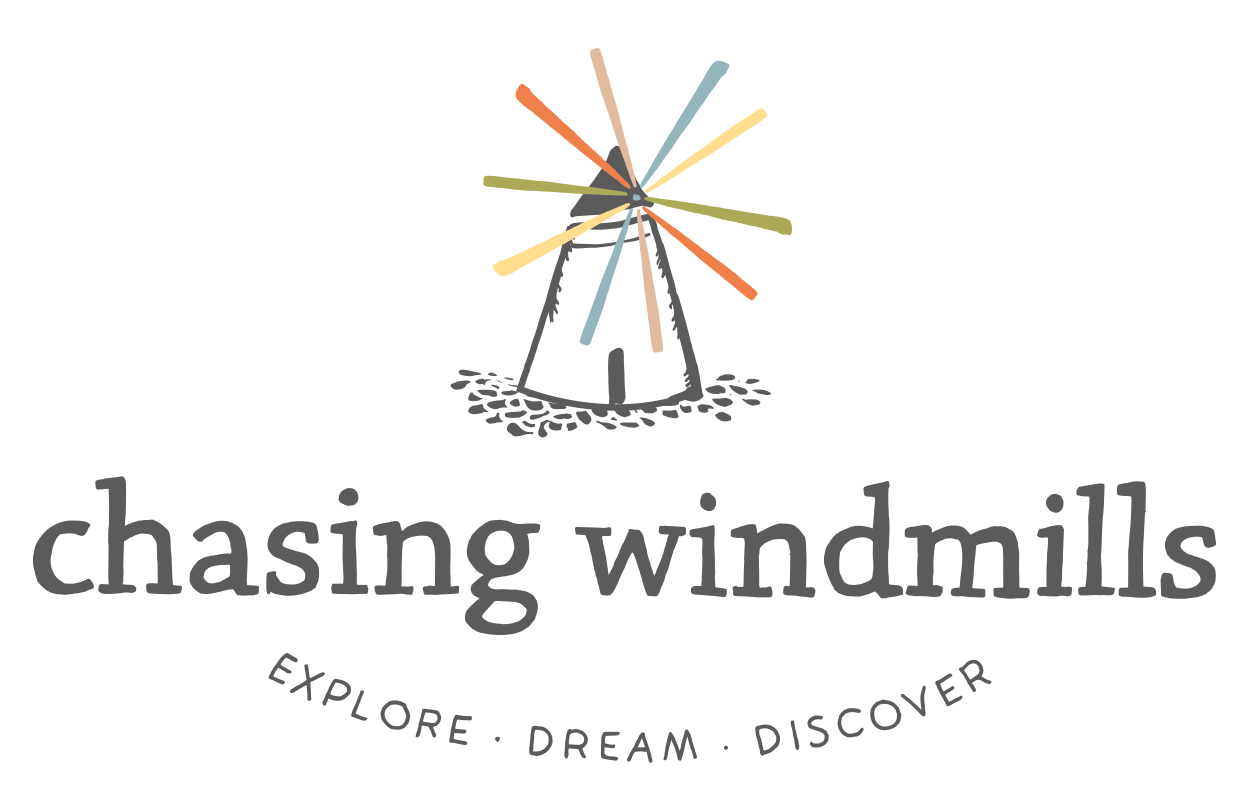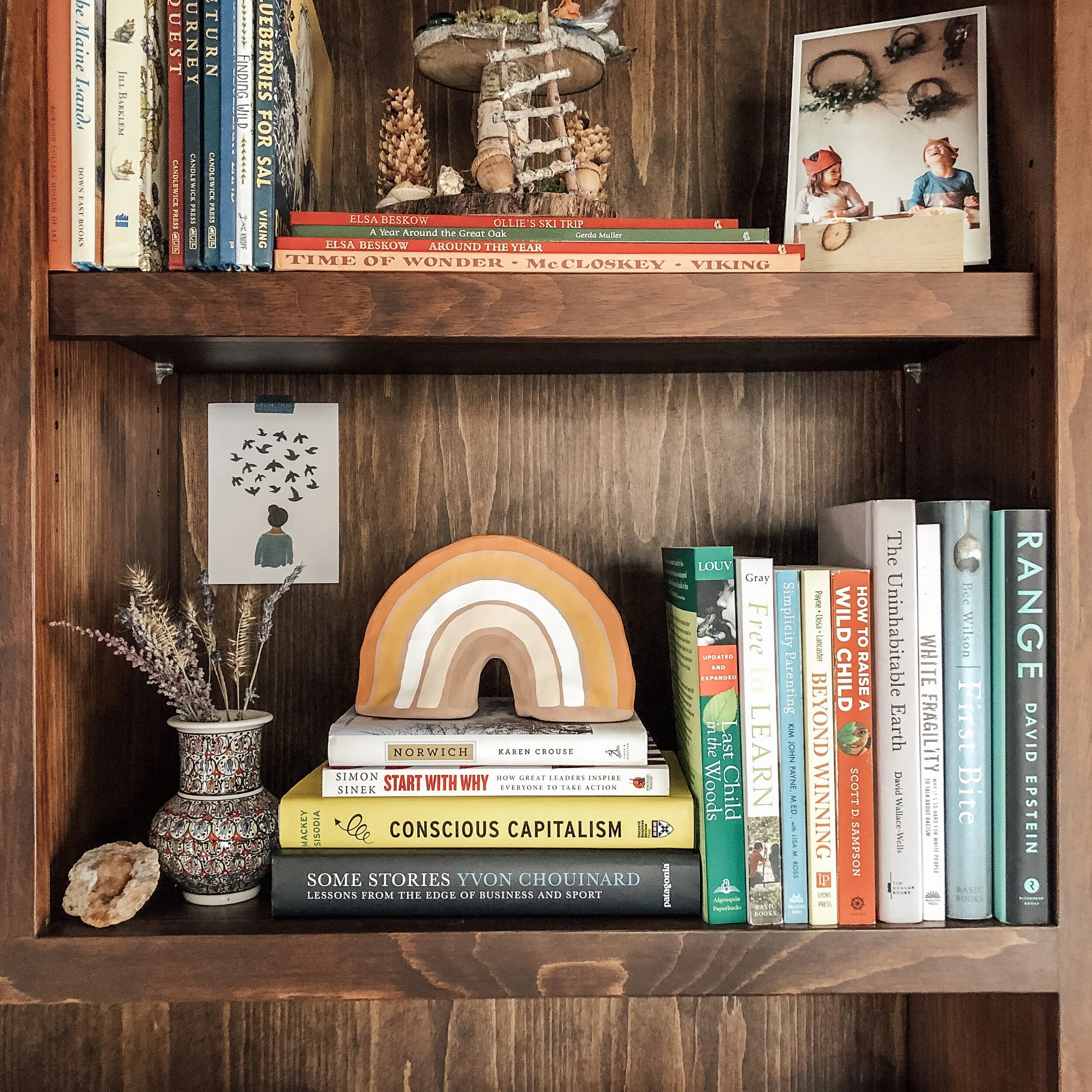Bookshelves surround both of our desks.
They are populated by treasured memories: family photos, watercolor paintings from our kids, collected treasures and, of course, books.
To be honest, JP is the reader in the family. I am the "read-the-first-five-chapters-of-every-book-and-then-have-JP-tell-me-the-rest" kind of reader. Lucky for us, we live within walking distance to our public library, and many of our reads are just a short stroll away and satisfy both of our reading styles :).
But every now and then, we come across a book that earns its place on our bookshelf — the kind of book that deserves underlining, re-reading, and sharing; the kind of book whose presence can offer comfort, remind us to think critically, and shape who we are.
You can tell a lot about a person by the books they read. What do they believe? What is the kind of person they want to be? What do they cherish? And so, we wanted to give a peek into who we are through books on our shelves. We highlighted a few of these books back in 2018, and you’re welcome to browse that selections here.
Since then, we wanted to share some additional favorites -- some on parenting, some on business, some on the world we live in -- and all impactful on how we go about our days as parents, small business owners, and human beings. Hopefully one of these will inspire your own reading list!
Range: Why Generalists Triumph in a Specialized World, by David Epstein. As parents and as individuals, we often receive the message that early specialization is critical to success. Not so, Range points out, with examples from artists, musicians, and athletes whose broad range of interests and sampling paved the way for their success later in life. We like to think that our broad range has helped us arrive here, to Chasing Windmills. Between the two of us, we have backgrounds in math, economics, sociology, law, and photography. Our backgrounds combined with our interests in wholesome living, Waldorf education, exploring the outdoors, and all things comfy has somehow landed us into this little merino wool business and we couldn’t be more grateful for this journey.
Norwich: One Tiny Vermont Town’s Secret to Happiness and Excellence, by Karen Crouse. How does the little town of Norwich produce a surprising number of happy, elite, Olympic athletes? Simply put, “the parents of Norwich learned through trial and error the best methods of nourishing happy athletes; by valuing participation and sportsmanship, and stressing fun, community, and self-improvement.”
Beyond Winning: Smart Parenting in a Toxic Sports Culture, by Kim John Payne, Luis Fernando Llosa, and Scott Lancaster. This book reminds us that youth sports should focus on fun, sportsmanship, and community—not the hyper-competitive win-at-all-costs adult-centered model of athletics.
Last Child in the Woods, by Richard Louv. This book is both an emotional and scientific plea to let kids be outside! As strange as it seems that nature needs an advocate, Louv is that person. By letting our kids immerse themselves in nature at a granular level, they learn to become stewards of the Earth—not to mention that it promotes their physical and mental health too!
How to Raise a Wild Child: The Art and Science of Falling In Love with Nature, by Scott D. Sampson. Written by a paleontologist with a passion for inspiring families to explore nature, How to Raise a Wild Child laments the fact that most children can identify more corporate logos than plants! Likening children outside to playful scientists, Sampson shows how nature is an invaluable teacher for our children.
Start with Why: How Great Leaders Inspire Everyone to Take Action, by Simon Sinek. Following his TedTalk with almost 50 million views, Sinek’s book is a blueprint for how to inspire action. Rather than just focusing on what we do and how we do it, Sinek encourages us to answer the critical question why -- “By WHY I mean what is your cause, purpose or belief?” Answering this question, not only inspires others to follow, but also sustains us through adversity.
Conscious Capitalism, by John Mackey & Raj Sisodia. Part of the “why” for Chasing Windmills is to be a small part of a broader movement to leverage business for the common good; to re-define what it means to be a “conscious company,” in the words of Whole Food’s founder — that is, “businesses galvanized by higher purposes that serve and align the interests of all their major stakeholders; businesses with conscious leaders who exist in service to the company’s purpose, the people it touches, and the planet; and businesses with resilient, caring cultures that make working there a source of great joy and fulfillment.”
Some Stories: Lessons from the Edge of Business and Sport, by Yvon Chouinard. This book is a collection of business and autobiographical essays from Patagonia’s iconic founder. Chouinard has re-defined what it means to be a responsible business, caring not just about profits, but people and planet too.
The Uninhabitable Earth, by David Wallace-Wells. Speaking of the planet, Wallace-Wells' book just may have been the most important and most difficult book JP has read in a long time. It is a window into the devastating human, economic, and environmental cost of climate change—not just in the distant future but today.
White Fragility: Why It’s So Hard for White People to Talk About Racism, by Robin DiAngelo. You can put DiAngelo’s book into the category of making us think about race critically. As an interracial family (our children are half-Chinese), we understand that diversity is something to be celebrated but also better understood. By putting racial attitudes under the microscope, DiAngelo shows how we can confront racism more productively in our society.
First Bite: How We Learn to Eat, by Bee Wilson. We are a family that loves food; we love sitting around a gathered table with family and friends; we love trying a new recipe together; we love the peace and nurturing fulfillment from a savored meal. But that doesn’t mean it’s always been easy to teach our kids to be open-minded about food. Wilson’s book reminds us that patient and encouraging exposure to good food will lead to families enjoying healthy and delicious meals together. While we may think we are born with our food preferences, Wilson shows how our palettes are learned—and can be re-learned too.
So, what’s on your bookshelf? We’re looking for recommendations for 2020 reading ;)!

